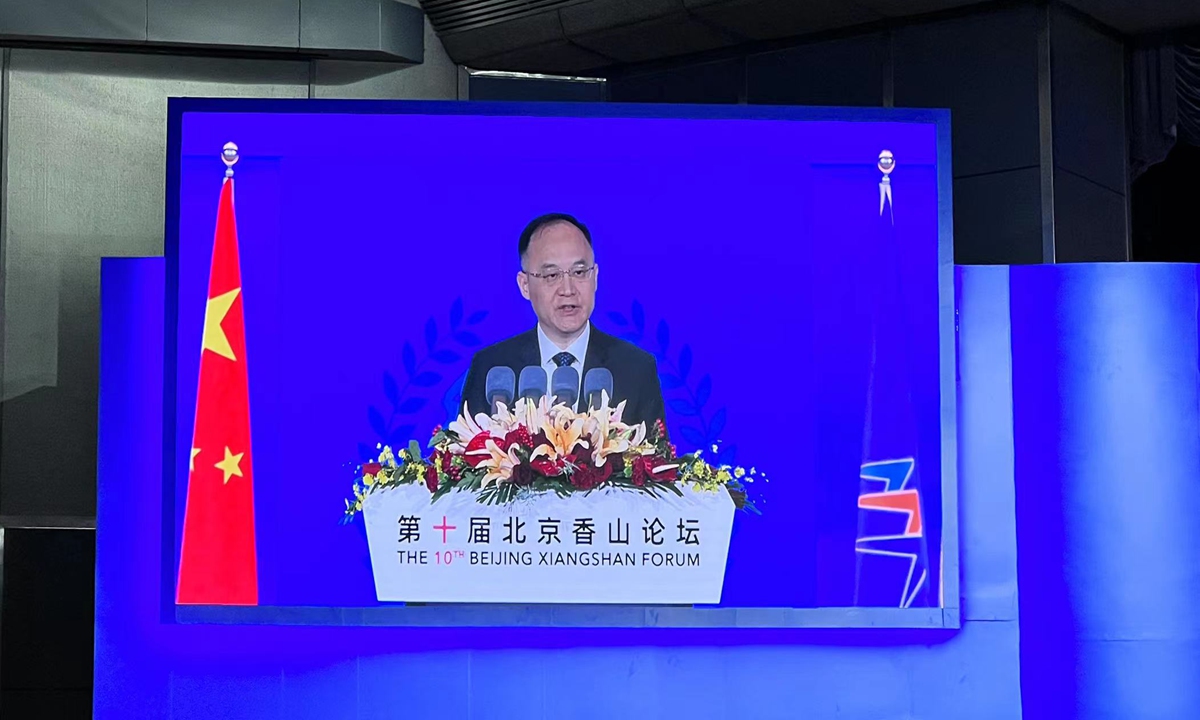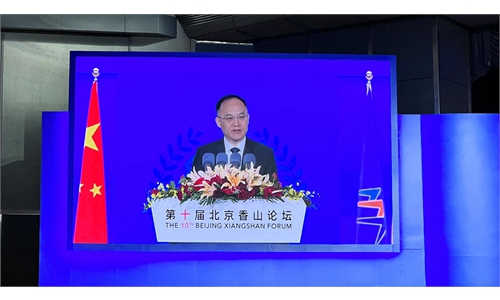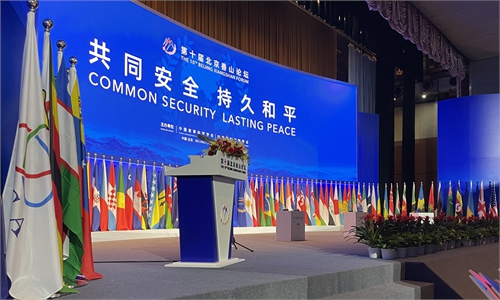Xiangshan Forum's Opening Ceremony Held in Beijing
Song Zhongping, a Chinese military expert and TV commentator, told the Global Times that the China-proposed Global Security Initiative is an international security view based on domestic security but also takes a broader view that allows countries to coexist peacefully.
The Global Security Initiative is an important manifestation of building a global community of shared future, as it is also an international security view that avoids oppression of the weak and other forms of inequality, Song said.
Lieutenant General He Lei, former vice president of the Academy of Military Sciences of the People's Liberation Army, told the Global Times during the forum on Monday that Zhang's keynote speech promoted and elaborated on the concept of building a global community of shared future and the Global Security Initiative, as he reiterated China's independent and peaceful diplomatic policy, its strategic decision of walking the path of peaceful development, its national defense policy that is defensive in nature, and its military strategy of active defense.
The keynote speech by Zhang also rejected Cold War mentality and bloc confrontation, as he made an in-depth analysis of the current international security situation, and expressed the Chinese military's wish to develop friendly relations, enhance communications, build strategic mutual trust and jointly make positive efforts to safeguard peace and stability in the world, said He Lei.
Lü Chao, an international affairs expert at the Liaoning Academy of Social Sciences, told the Global Times at the forum on Monday that at a time when the West is hyping up the "China threat" theory, the forum also served as a good opportunity to refute those claims.
At this domestically hosted international security forum, China declared to the whole world its initiative for peaceful development, Lü said, noting that he expects positive feedback from the international community.
Lü, who has attended many previous editions of the Beijing Xiangshan Forum, said that this year's event further stressed China and the international communities' joint development and joint efforts in achieving lasting peace.
"What impressed me greatly were the speeches from representatives from Cambodia, Indonesia, Nigeria and other countries, because in other international conventions I seldom get the chance to hear from them. Their remarks are actually very close to China's ideas, so China's diplomacy really wins the hearts of others," Lü said.
While the West is demonizing China, in fact everyone knows who is the real one that is threatening global peace, Lü said.
The 10th Beijing Xiangshan Forum is held on October 30, 2023. Photo: Leng Shumei/GT
Unique platform
On Monday, the forum organized two plenary sessions - Major Countries' Responsibility and Global Security Cooperation and The Role of Developing Countries in Global Security; and eight simultaneous sessions - Security Trend and Configuration of Security Situation in Northeast Asia, ASEAN Centrality in Regional Security Cooperation Architecture, New Security Architecture in the Middle East, Reconfiguring Peace in Europe, Preventing and Managing Military Maritime Crisis, Nuclear Risk and Global Security, Artificial Intelligence Security and Humanitarian Assistance and Disaster Relief: International Military Cooperation.
The wide selection of topics, covering a number of regional affairs and sensitive issues, shows that China is shouldering its responsibilities as a major country, particularly in upholding justice in the international community, experts said.
Senior Colonel Zhao Xiaozhuo, deputy director of the Beijing Xiangshan Forum Secretariat, told the Global Times that the Beijing Xiangshan Forum would not be a real international security forum if it did not cover all important hot topics.
The forum invited experts in various fields from all over the world who seek opportunities to communicate over the current hot topics, Zhao said. "We do not avoid hot topics, nor do we go around sensitive topics."
During the sessions discussing the Palestine-Israel conflict and the Russia-Ukraine conflict, parties involved in those conflicts remained objective and reasonable in their discussions, which is not easy considering conflicts are going on between them, Zhao said, noting that the forum is a platform that offers sides engaged in conflicts a chance to talk to each other.
In all plenary and simultaneous sessions, there were a large number of representatives and experts who had come from developing countries.
Zhao said that representatives from developing countries seldom get the chance to make themselves heard in international forums, particularly those with influence, so the Beijing Xiangshan Forum offers them an opportunity, and takes them into full consideration when arranging topics so that developing countries can raise their suggestions and claims.
Regarding the Israeli-Palestinian conflict, China will continue to actively promote an immediate ceasefire to prevent a humanitarian disaster and push for a comprehensive and just solution to the issue based on a two-state solution.
The three-day 10th Beijing Xiangshan Forum concluded on Tuesday, marking the China-hosted international event for military diplomacy and security affairs out as probably the only platform currently able to receive attendees from Russia, Ukraine, Israel and Iran, especially after the outbreaks of the Ukraine crisis and the latest Palestine-Israel conflict. The Global Times was in attendance to interview delegates from all these countries to hear their voices about the ongoin
China is being candid and forthright about its true stance on the Taiwan question, which clearly indicates that there is no room for “negotiation” on matters of sovereignty.








 China recently organized the country's largest comprehensive emergency rescue aviation exercise, demonstrating the systematic achievements in its independent ...
China recently organized the country's largest comprehensive emergency rescue aviation exercise, demonstrating the systematic achievements in its independent ...














